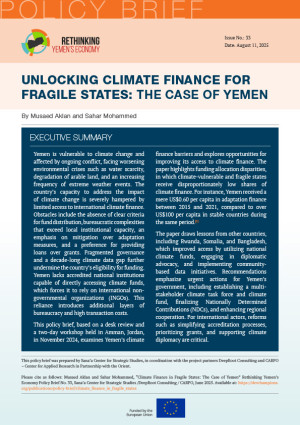Others
by Musaed Aklan and Sahar Mohammed
Yemen is highly vulnerable to climate change, but the country’s ability to address its impact is severely hampered by limited access to international climate finance. Obstacles include the absence of clear criteria for fund distribution, bureaucratic complexities that exceed local institutional capacity, an emphasis on mitigation over adaptation, a preference for providing loans over grants, and fragmented governance. Yemen also lacks accredited national institutions capable of directly accessing climate funds, which forces it to rely on international non-governmental organizations (INGOs). This RYE Policy Brief examines Yemen’s climate finance barriers and explores opportunities for improving access to climate finance. In doing so, the paper draws lessons from other countries, including Rwanda, Somalia, and Bangladesh, which improved access by utilizing national climate funds, engaging in diplomatic advocacy, and implementing community-based data initiatives. Recommendations emphasize urgent actions by Yemen’s government, including establishing a multi-stakeholder climate task force and climate fund, finalizing Nationally Determined Contributions (NDCs), and enhancing regional cooperation.
Download publication in English Download publication in Arabic
